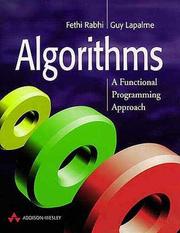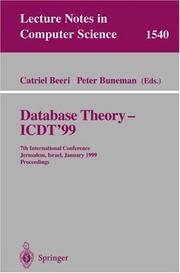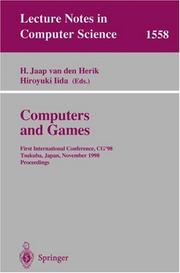| Listing 1 - 4 of 4 |
Sort by
|

ISBN: 0201596040 9780201596045 Year: 1999 Publisher: Harlow: Addison-Wesley,
Abstract | Keywords | Export | Availability | Bookmark
 Loading...
Loading...Choose an application
- Reference Manager
- EndNote
- RefWorks (Direct export to RefWorks)
Computer algorithms --- Functional programming languages --- 681.3*D11 --- 681.3*F2 --- Programming languages (Electronic computers) --- Algorithms --- Applicative (functional) programming --- Analysis of algorithms and problem complexity--See also {681.3*B6}; {681.3*B7}; {681.3*F13} --- 681.3*F2 Analysis of algorithms and problem complexity--See also {681.3*B6}; {681.3*B7}; {681.3*F13} --- 681.3*D11 Applicative (functional) programming

ISBN: 3540654313 3642635814 3642584128 9783540654315 Year: 1999 Publisher: Berlin Springer
Abstract | Keywords | Export | Availability | Bookmark
 Loading...
Loading...Choose an application
- Reference Manager
- EndNote
- RefWorks (Direct export to RefWorks)
N COMPUTER applications we are used to live with approximation. Var I ious notions of approximation appear, in fact, in many circumstances. One notable example is the type of approximation that arises in numer ical analysis or in computational geometry from the fact that we cannot perform computations with arbitrary precision and we have to truncate the representation of real numbers. In other cases, we use to approximate com plex mathematical objects by simpler ones: for example, we sometimes represent non-linear functions by means of piecewise linear ones. The need to solve difficult optimization problems is another reason that forces us to deal with approximation. In particular, when a problem is computationally hard (i. e. , the only way we know to solve it is by making use of an algorithm that runs in exponential time), it may be practically unfeasible to try to compute the exact solution, because it might require months or years of machine time, even with the help of powerful parallel computers. In such cases, we may decide to restrict ourselves to compute a solution that, though not being an optimal one, nevertheless is close to the optimum and may be determined in polynomial time. We call this type of solution an approximate solution and the corresponding algorithm a polynomial-time approximation algorithm. Most combinatorial optimization problems of great practical relevance are, indeed, computationally intractable in the above sense. In formal terms, they are classified as Np-hard optimization problems.
Programming --- Computer science --- Mathematical statistics --- algoritmen --- 681.3*G16 Optimization: constrained optimization; gradient methods; integer programming; least squares methods; linear programming; nonlinear programming (Numericalanalysis) --- Optimization: constrained optimization; gradient methods; integer programming; least squares methods; linear programming; nonlinear programming (Numericalanalysis) --- 681.3*G12 Approximation: chebyshev; elementary function; least squares; linear approximation; minimax approximation and algorithms; nonlinear and rational approximation; spline and piecewise polynomial approximation (Numerical analysis) --- Approximation: chebyshev; elementary function; least squares; linear approximation; minimax approximation and algorithms; nonlinear and rational approximation; spline and piecewise polynomial approximation (Numerical analysis) --- 681.3*F2 Analysis of algorithms and problem complexity--See also {681.3*B6}; {681.3*B7}; {681.3*F13} --- Analysis of algorithms and problem complexity--See also {681.3*B6}; {681.3*B7}; {681.3*F13} --- 681.3*G3 Probability and statistics: probabilistic algorithms (including Monte Carlo);random number generation; statistical computing; statistical software (Mathematics of computing) --- Probability and statistics: probabilistic algorithms (including Monte Carlo);random number generation; statistical computing; statistical software (Mathematics of computing) --- 681.3*G3 --- Combinatorial optimization --- Computational complexity --- Computer algorithms --- 681.3*F2 --- 681.3*G12 --- 681.3*G16 --- 681.3*G2 --- Complexity, Computational --- Optimization, Combinatorial --- 681.3*G2 Discrete mathematics (Mathematics of computing) --- Discrete mathematics (Mathematics of computing) --- Algorithms --- Electronic data processing --- Machine theory --- Combinatorial analysis --- Mathematical optimization --- Computational Complexity --- Optimisation combinatoire --- Complexité de calcul (Informatique) --- Algorithmes --- Computer programming. --- Algorithms. --- Computer mathematics. --- Computer science—Mathematics. --- Operations research. --- Decision making. --- Information technology. --- Business—Data processing. --- Programming Techniques. --- Algorithm Analysis and Problem Complexity. --- Computational Mathematics and Numerical Analysis. --- Discrete Mathematics in Computer Science. --- Operations Research/Decision Theory. --- IT in Business. --- IT (Information technology) --- Technology --- Telematics --- Information superhighway --- Knowledge management --- Deciding --- Decision (Psychology) --- Decision analysis --- Decision processes --- Making decisions --- Management --- Management decisions --- Choice (Psychology) --- Problem solving --- Operational analysis --- Operational research --- Industrial engineering --- Management science --- Research --- System theory --- Computer mathematics --- Mathematics --- Algorism --- Algebra --- Arithmetic --- Computers --- Electronic computer programming --- Electronic digital computers --- Programming (Electronic computers) --- Coding theory --- Decision making --- Foundations

ISBN: 3540654526 3540492577 Year: 1999 Publisher: Berlin, Heidelberg : Springer,
Abstract | Keywords | Export | Availability | Bookmark
 Loading...
Loading...Choose an application
- Reference Manager
- EndNote
- RefWorks (Direct export to RefWorks)
Databaseresearchisa?eldofcomputersciencewheretheorymeetsapplications. Many concepts and methods, that were regarded as issues of theoretical interest when initially proposed, are now included in implemented database systems and related products. Examples abound in the ?elds of database design, query languages, query optimization, concurrency control, statistical databases, and many others. The papers contained in this volume were presented at ICDT’99, the 7th - ternationalConferenceonDatabaseTheory,inJerusalem,Israel,January10–12, 1999. ICDT is an international forum for research on the principles of database systems. It is a biennial conference, and has a tradition of being held in beau- ful European sites: Rome in 1986, Bruges in 1988, Paris in 1990, Berlin in 1992, Prague in 1995, and Delphi in 1997. From 1992, ICDT has been merged with another series of conferences on theoretical aspects of database systems, The Symposium on Mathematical Fundamentals of Database Systems (MFDBS), that was initiated in Dresden (1987), and continued in Visegrad (1989) and Rostock (1991). ICDT aims to enhance the exchange of ideas and cooperation in database research both within uni?ed Europe, and between Europe and the other continents. ICDT’99 was organized in cooperation with: ACM Special Interest Group on Management of Data (Sigmod) IEEE Israel Chapter ILA — The Israel Association for Information Processing EDBT Foundation ICDT’99 was sponsored by: The Hebrew University of Jerusalem Tel Aviv University Tandem Labs Israel, a Compaq Company This volume contains 26 technical papers selected from 89 submissions.
Database management --- Computer Science --- Engineering & Applied Sciences --- Congresses --- 681.3*H2 --- 681.3*F13 --- 681.3*F41 --- 681.3*H4 --- 681.3*I21 --- Database management: security; integrity; protection--See also {?681.5*E5} --- Complexity classes: complexity hierarchies; machine-independent complexity; reducibility and completeness; relations among complexity classes; relations among complexity measures (Computation by abstract devices)--See also {681.3*F2} --- Mathematical logic: computability theory; computational logic; lambda calculus; logic programming; mechanical theorem proving; model theory; proof theory;recursive function theory--See also {681.3*F11}; {681.3*I22}; {681.3*I23} --- Information systems applications (GIS etc.) --- Applications and expert systems (Artificial intelligence). Cartography. Games. Industrial automation. Law. Medicine and science. Natural language interfaces. Office automation--See also {681.3*H4}; {681.3*J} --- 681.3*I21 Applications and expert systems (Artificial intelligence). Cartography. Games. Industrial automation. Law. Medicine and science. Natural language interfaces. Office automation--See also {681.3*H4}; {681.3*J} --- 681.3*H4 Information systems applications (GIS etc.) --- 681.3*F41 Mathematical logic: computability theory; computational logic; lambda calculus; logic programming; mechanical theorem proving; model theory; proof theory;recursive function theory--See also {681.3*F11}; {681.3*I22}; {681.3*I23} --- 681.3*F13 Complexity classes: complexity hierarchies; machine-independent complexity; reducibility and completeness; relations among complexity classes; relations among complexity measures (Computation by abstract devices)--See also {681.3*F2} --- 681.3*H2 Database management: security; integrity; protection--See also {?681.5*E5} --- Computer science. --- Data structures (Computer science). --- Computers. --- Mathematical logic. --- Multimedia information systems. --- Artificial intelligence. --- Computer Science. --- Data Structures, Cryptology and Information Theory. --- Multimedia Information Systems. --- Computation by Abstract Devices. --- Mathematical Logic and Formal Languages. --- Artificial Intelligence (incl. Robotics). --- Information Systems Applications (incl. Internet). --- AI (Artificial intelligence) --- Artificial thinking --- Electronic brains --- Intellectronics --- Intelligence, Artificial --- Intelligent machines --- Machine intelligence --- Thinking, Artificial --- Bionics --- Cognitive science --- Digital computer simulation --- Electronic data processing --- Logic machines --- Machine theory --- Self-organizing systems --- Simulation methods --- Fifth generation computers --- Neural computers --- Computer-based multimedia information systems --- Multimedia computing --- Multimedia information systems --- Multimedia knowledge systems --- Information storage and retrieval systems --- Algebra of logic --- Logic, Universal --- Mathematical logic --- Symbolic and mathematical logic --- Symbolic logic --- Mathematics --- Algebra, Abstract --- Metamathematics --- Set theory --- Syllogism --- Automatic computers --- Automatic data processors --- Computer hardware --- Computing machines (Computers) --- Electronic calculating-machines --- Electronic computers --- Hardware, Computer --- Computer systems --- Cybernetics --- Calculators --- Cyberspace --- Information structures (Computer science) --- Structures, Data (Computer science) --- Structures, Information (Computer science) --- File organization (Computer science) --- Abstract data types (Computer science) --- Informatics --- Science --- Data structures (Computer scienc. --- Multimedia systems. --- Data Structures and Information Theory. --- Artificial Intelligence. --- Application software. --- Application computer programs --- Application computer software --- Applications software --- Apps (Computer software) --- Computer software --- Database management. --- Data base management --- Data services (Database management) --- Database management services --- DBMS (Computer science) --- Generalized data management systems --- Services, Database management --- Systems, Database management --- Systems, Generalized database management

ISBN: 3540657665 3540489576 Year: 1999 Publisher: Berlin : Springer,
Abstract | Keywords | Export | Availability | Bookmark
 Loading...
Loading...Choose an application
- Reference Manager
- EndNote
- RefWorks (Direct export to RefWorks)
Computer games --- Microcomputers --- 681.3*G --- 681.3*F2 --- 681.3*I21 --- 681.3*I26 --- 681.3*I28 --- 681.3*G Mathematics of computing --- Mathematics of computing --- Home computers --- Micro computers --- Micros (Microcomputers) --- PCs (Microcomputers) --- Personal computers --- Small computers --- Minicomputers --- Application software --- Electronic games --- 681.3*I28 Problem solving, control methods and search: backtracking dynamic program- ming graph and tree search strategies heuristics plan execution, formationand generation (Artificial intelligence)--See also {681.3*F22} --- Problem solving, control methods and search: backtracking dynamic program- ming graph and tree search strategies heuristics plan execution, formationand generation (Artificial intelligence)--See also {681.3*F22} --- 681.3*I26 Learning: analogies concept learning induction knowledge acquisition language acquisition parameter learning (Artificial intelligence)--See also {681.3*K32} --- Learning: analogies concept learning induction knowledge acquisition language acquisition parameter learning (Artificial intelligence)--See also {681.3*K32} --- 681.3*I21 Applications and expert systems (Artificial intelligence). Cartography. Games. Industrial automation. Law. Medicine and science. Natural language interfaces. Office automation--See also {681.3*H4} {681.3*J} --- Applications and expert systems (Artificial intelligence). Cartography. Games. Industrial automation. Law. Medicine and science. Natural language interfaces. Office automation--See also {681.3*H4} {681.3*J} --- Analysis of algorithms and problem complexity --- Computer science. --- Information technology. --- Business --- Algorithms. --- Computer science --- Artificial intelligence. --- Calculus of variations. --- Computer Science. --- Algorithm Analysis and Problem Complexity. --- Artificial Intelligence (incl. Robotics). --- Mathematics of Computing. --- Calculus of Variations and Optimal Control; Optimization. --- IT in Business. --- Data processing. --- Mathematics. --- 681.3*I28 Problem solving, control methods and search: backtracking; dynamic program- ming; graph and tree search strategies; heuristics; plan execution, formationand generation (Artificial intelligence)--See also {681.3*F22} --- Problem solving, control methods and search: backtracking; dynamic program- ming; graph and tree search strategies; heuristics; plan execution, formationand generation (Artificial intelligence)--See also {681.3*F22} --- 681.3*I26 Learning: analogies; concept learning; induction; knowledge acquisition; language acquisition; parameter learning (Artificial intelligence)--See also {681.3*K32} --- Learning: analogies; concept learning; induction; knowledge acquisition; language acquisition; parameter learning (Artificial intelligence)--See also {681.3*K32} --- 681.3*I21 Applications and expert systems (Artificial intelligence). Cartography. Games. Industrial automation. Law. Medicine and science. Natural language interfaces. Office automation--See also {681.3*H4}; {681.3*J} --- Applications and expert systems (Artificial intelligence). Cartography. Games. Industrial automation. Law. Medicine and science. Natural language interfaces. Office automation--See also {681.3*H4}; {681.3*J} --- Isoperimetrical problems --- Variations, Calculus of --- Maxima and minima --- AI (Artificial intelligence) --- Artificial thinking --- Electronic brains --- Intellectronics --- Intelligence, Artificial --- Intelligent machines --- Machine intelligence --- Thinking, Artificial --- Bionics --- Cognitive science --- Digital computer simulation --- Electronic data processing --- Logic machines --- Machine theory --- Self-organizing systems --- Simulation methods --- Fifth generation computers --- Neural computers --- Computer mathematics --- Discrete mathematics --- Algorism --- Algebra --- Arithmetic --- IT (Information technology) --- Technology --- Telematics --- Information superhighway --- Knowledge management --- Informatics --- Science --- Mathematics --- Foundations --- Computer software. --- Mathematical optimization. --- Artificial Intelligence. --- Optimization (Mathematics) --- Optimization techniques --- Optimization theory --- Systems optimization --- Mathematical analysis --- Operations research --- System analysis --- Software, Computer --- Computer systems --- Computer science—Mathematics. --- Business—Data processing. --- Internet games --- Television games --- Videogames --- Games --- Video games
| Listing 1 - 4 of 4 |
Sort by
|

 Search
Search Feedback
Feedback About
About Help
Help News
News